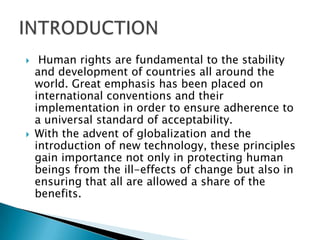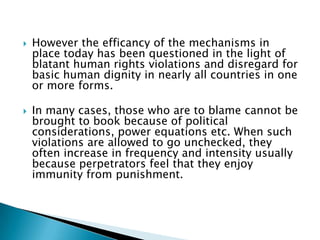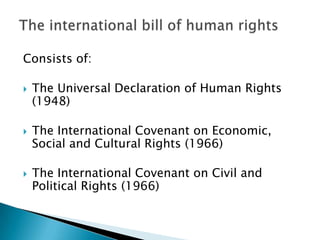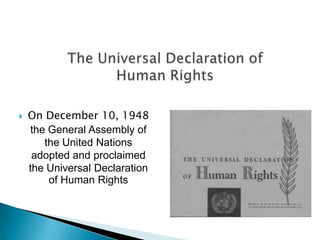Human rights
- 2. HUMAN RIGHTS
- 3. INTRODUCTION TO HUMAN RIGHTS DEFENITION OF HUMAN RIGHTS EVOLUTION OF HUMAN RIGHTS CLASSIFICATION OF HUMAN RIGHTS
- 4. Human rights are fundamental to the stability and development of countries all around the world. Great emphasis has been placed on international conventions and their implementation in order to ensure adherence to a universal standard of acceptability. With the advent of globalization and the introduction of new technology, these principles gain importance not only in protecting human beings from the ill-effects of change but also in ensuring that all are allowed a share of the benefits.
- 5. However the efficancy of the mechanisms in place today has been questioned in the light of blatant human rights violations and disregard for basic human dignity in nearly all countries in one or more forms. In many cases, those who are to blame cannot be brought to book because of political considerations, power equations etc. When such violations are allowed to go unchecked, they often increase in frequency and intensity usually because perpetrators feel that they enjoy immunity from punishment.
- 6. Human rights are the rights a person has simply because he or she is a human being Human Rights are the basic entitlements to be met for individuals to live with dignity
- 7. Human dignity Universality Inalienability Indivisibility
- 8. The International Labour Organization (1919) aim: oversee treaties protecting workers The League of Nations (1919) aim: international peace and cooperation The United Nations (1945) aim: cooperation in international law, international security, economic development, human rights
- 9. Consists of: The Universal Declaration of Human Rights (1948) The International Covenant on Economic, Social and Cultural Rights (1966) The International Covenant on Civil and Political Rights (1966)
- 10. On December 10, 1948 the General Assembly of the United Nations adopted and proclaimed the Universal Declaration of Human Rights
- 11. Civil Rights Political Rights Economic Rights Social Rights Cultural Rights
- 12. Civil rights include the ensuring of people’s physical integrity and safety. Protection from discrimination on grounds such as physical or mental disability, gender, religion, race, national origin, age, status as a member of the uniformed services, sexual orientation, or gender identity. Individual rights such as privacy, the freedoms of thought and conscience, speech and expression, religion, the press, and movement.
- 13. Political rights include natural justice (procedural fairness) in law, such as the rights of the accused, including the right to a fair trial;due process; the right to seek redress or a legal remedy; rights of participation in civil society and politics such as freedom of association the right to assemble, the right to petition, the right of self-defense, and the right to vote.
- 14. Economic, social and cultural rights are socio- economic human rights, such as the right to education, right to housing, right to adequate standard of living and the right to health. Economic, social and cultural rights are recognized and protected in international and regional human rights instruments. Member states have a legal obligation to respect, protect and fullfil economic, social and cultural rights and are expected to take "progressive action" towards their fullfilment.














